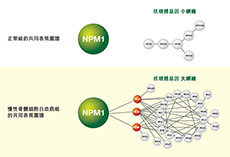Cancer is caused by abnormal changes in genes. However, the human genome has more than 20,000 protein-coding genes and around 0.2 billion gene pairs. The conventional way of identifying cancer gene markers focuses on the changes in individual genes; it cannot identify the interactions among genes and their systemic changes.
With the support of biostatisticians from Harvard University, Chair Professor Benjamin Yung (middle), Dr Lawrence Chan (left) and Dr Cesar Wong (right) at the Department of Health Technology and Informatics have a breakthrough in developing a big data analysis platform, unveiling the unregulated pattern of gene network in cancer through analyzing interactions among 0.2 billion gene pairs and identifying their co-expressions within two days. They have also discovered Nucleophosmin (NPM1), the potential diagnostic and therapeutic target gene in Chronic Myelogenous Leukemia (CML) and its associated genes. These discoveries contribute to the development of potential NPM1-oriented treatment strategies for CML.
With its findings to be published in Scientific Reports by Nature Publishing Group, the study will enhance biomedical scientists’ understanding of cancer pathogenesis, contributing to making targeted therapy more targeted. Also, this platform can readily be applied to other diseases for diagnostic, prognostic and therapeutic investigation. Details>>

